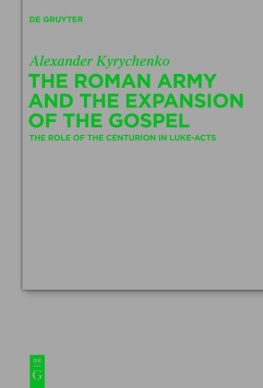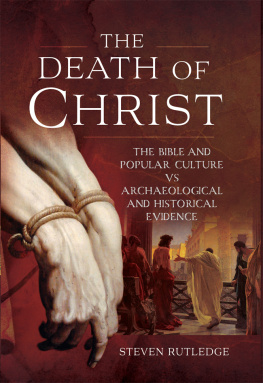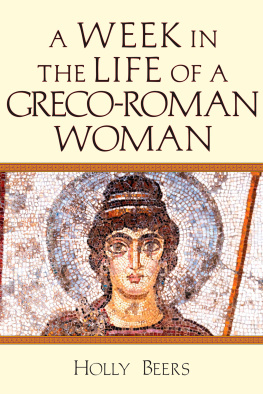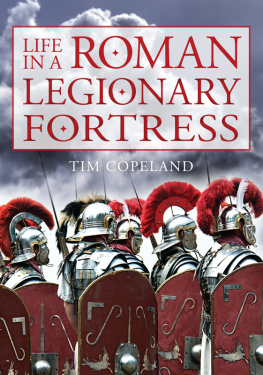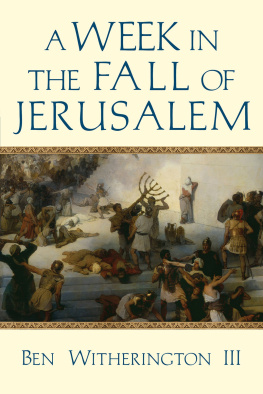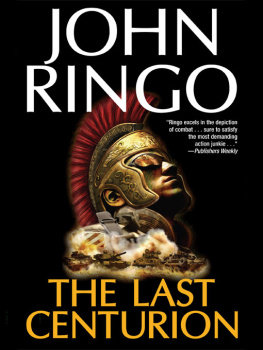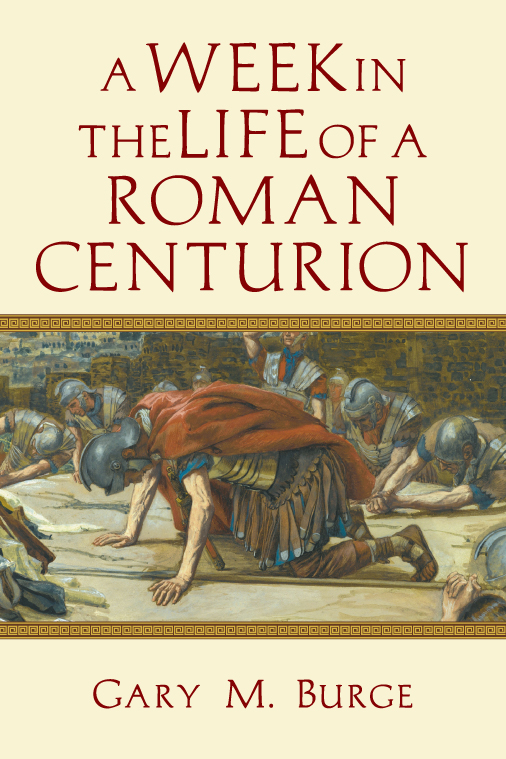A WEEK IN
THE LIFE OF A
ROMAN
CENTURION
G ARY M. B URGE

www.IVPress.com/academic
For my parents
InterVarsity Press
P.O. Box 1400, Downers Grove, IL 60515-1426
2015 by Gary M. Burge
All rights reserved. No part of this book may be reproduced in any form without written permission from InterVarsity Press.
InterVarsity Press is the book-publishing division of InterVarsity Christian Fellowship/USA, a movement of students and faculty active on campus at hundreds of universities, colleges and schools of nursing in the United States of America, and a member movement of the International Fellowship of Evangelical Students. For information about local and regional activities, visit intervarsity.org.
All Scripture quotations, unless otherwise indicated, are taken from the Holy Bible, Todays New International Version Copyright 2001 by International Bible Society. All rights reserved.
Cover design: Cindy Kiple
Image: The Confession of the Centurion, illustration from The Life of Our Lord Jesus Christ, by James Jacques Joseph Tissot / Brooklyn Museum of Art, New York. Purchased by Public Subscription / Bridgeman Images
ISBN 978-0-8308-9773-5 (digital)
ISBN 978-0-8308-2462-5 (print)
Contents
Characters
Albus A centurion and primus pilus of a Roman legion in north Syria. A career centurion assigned to the twelfth Roman legion called Fulminata. An old friend of Appius.
Amazon A female Roman gladiator traveling with blood-sport shows in the eastern Mediterranean.
Antipas Known as Herod Antipas, he was the son of Herod the Great. At his fathers death in 4 B.C. , he gained rule over western Galilee, while his brother Philip ruled eastern Galilee and portions of southern Syria. Known best for killing John the Baptist (Mk 6:14-28) and his appearance at the trial of Jesus (Lk 23:6-12). He ruled until A.D. 39.
Appius A centurion and primus pilus of a Roman legion in south Syria. Originally from Attalia in south Anatolia on the Mediterranean Sea. A career centurion assigned to the third Roman legion called Gallica (based in Raphana, Syria).
Axius A legionnaire stationed in Caesarea, striving to become a centurion. Originally from Carthage in north Africa.
Chuza A Jewish bureaucrat who owns a concession to collect taxes in the district of Capernaum. Also the financial minister of Galilee under the local rule of Herod Antipas. During this period, he lives in Sepphoris. His wife is Joanna, a secret follower of Jesus. See Luke 8:1-3.
Gaius The Arab household slave of Appius who manages Appiuss villa as well as his slaves.
Livia The female slave/concubine of the centurion Appius.
Marcus Appiuss personal military assistant, assigned to him in Caesarea. Originally from Sardis in west Anatolia.
Mariam The midwife of Capernaum and the wife of the only physician/healer in the village.
Maxilla A female Roman gladiator traveling with blood-sport shows in the eastern Mediterranean.
Onias The father of Tullus, an oil trader who lives in Emesa, Syria. Today this is Homs, Syria.
Pilatus Known as Pontius Pilatus (or Pontius Pilate), he was the fifth governor of Judea under Roman rule. He was responsible for the finances of the province and had at his command four or five military cohorts. Appointed by the Emperor Tiberius in A.D. 26 from the Roman upper middle class (or equestrians), his rule was severe and notorious for its violence. His murder of many Samaritans and the outrage that followed led to his ouster in A.D. 36.
Tobias The leading elder of the Jewish village of Capernaum who negotiates diplomatic connections with the Romans. He is likely a Pharisee and committed to resistance against Rome.
Tullus The slave/scribe of Appius, captured in the siege of Emesa, Syria.
1
From Emesa to Raphana
Tullus never imagined he would see a Parthian standing this close, armed and clearly intending harm. The Parthian would make fast work of him. How in the name of the gods, he wondered, had the Parthians breached the fortress of Dura-Europos?
Tullus remembered what he had learned about the Parthians. In the Roman barracks they talked about them almost every day. And the Romans hated them. They mocked them and shared endless jokes about them. Parthians were just another breed of barbarian, with an uncivilized culture and undisciplined ranks. Killing them was easy, or at least that was what the centurions told the soldiers as they drilled them daily on the fort grounds. The javelin-targeting pole in the courtyard usually wore a Parthian uniform, torn from some unfortunate victim in a recent skirmish. It was riddled with holes. Everyone knew the enemy was Parthian.
Tullus was not made for battle. He had neither the instincts nor the physique. He could have been an archer. Maybe. Archers were different from infantry, more refined, perhaps even smarter. He imagined them making mathematical calculations as they fired their arrows in careful paths through the sky. Arrows were graceful. Swords were not. But he never imagined himself as a legionnaire, who could march endlessly, carrying armor, supplies and weapons, and then at days close begin a siege work.
Tullus was literate. And this alone saved him. The truth is, he was lucky to be alive at all.
The Parthian Empire
Parthia was the first-century name for the great Persian Empire, which reached back into Old Testament times (Cyrus the Persian king liberated the Jews following the exile). The Parthians had their capitals at Ecbatana and Ctesiphon, not far from Babylon. The empire desired expansion west into Mesopotamia because of the prosperity of the Tigris and Euphrates river valleys. And yet it could go no further, due to the Roman Empire that blocked it. The desert region west of Mesopotamia (and south of the Euphrates) was called Syria. Parthia dreamed of controlling Syria. But western armies (both Greeks and Romans) always stopped them.

Two years earlier Tullus had been captured during the siege of Emesa on the Orontes River in Syria, when the Emesani tribes revolted. He was not one of the EmesaniTulluss father was from the coast, a trader in olive oiland when the siege of Emesa was finished, Tullus was found hiding in the ruins of his school. He had heard about Roman sieges before. But nothing could have prepared him. He believed that the Romans were the true barbarians of the world. And Syria had been under Romes control for more than seventy-five years.
As the pillaging of the town wound down, Tullus found himself tied to hundreds of other petrified young men and paraded before the Romans. Slavers who shadowed the legion were offering the officers sizable sums to take the young men away to slave markets in Antioch. The young women had already disappeared. And now, with the bartering pounding loudly in his ears, his senses dulled. Tullus was in shock. Behind him the city of his childhood lay smoldering. The smells of a burning city and the cries of the defeated would never leave his memory. He could not imagine the fate of his familyin fact, he pushed these thoughts from his mindand now, as he stood in the hot desert sun, he listened to men from distant places putting a price on his life. He would become a laborer, a household servant, or perhaps a sex slave in a large and distant Greek city. He considered praying. But to whom? The Roman gods were obviously powerful. He knew their names. Hed grown up with them.





